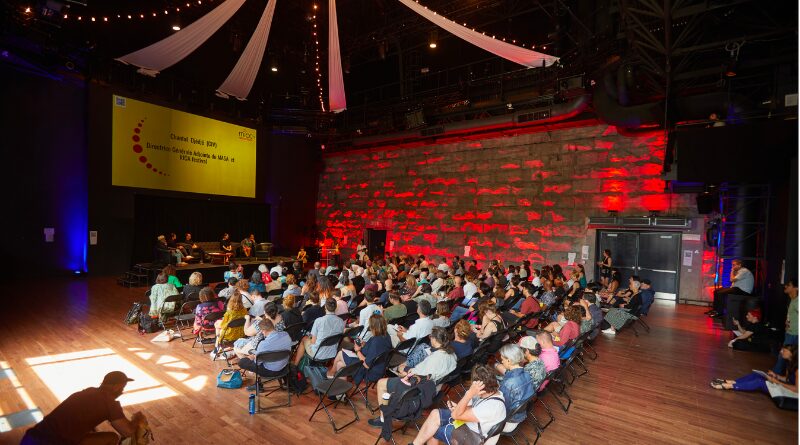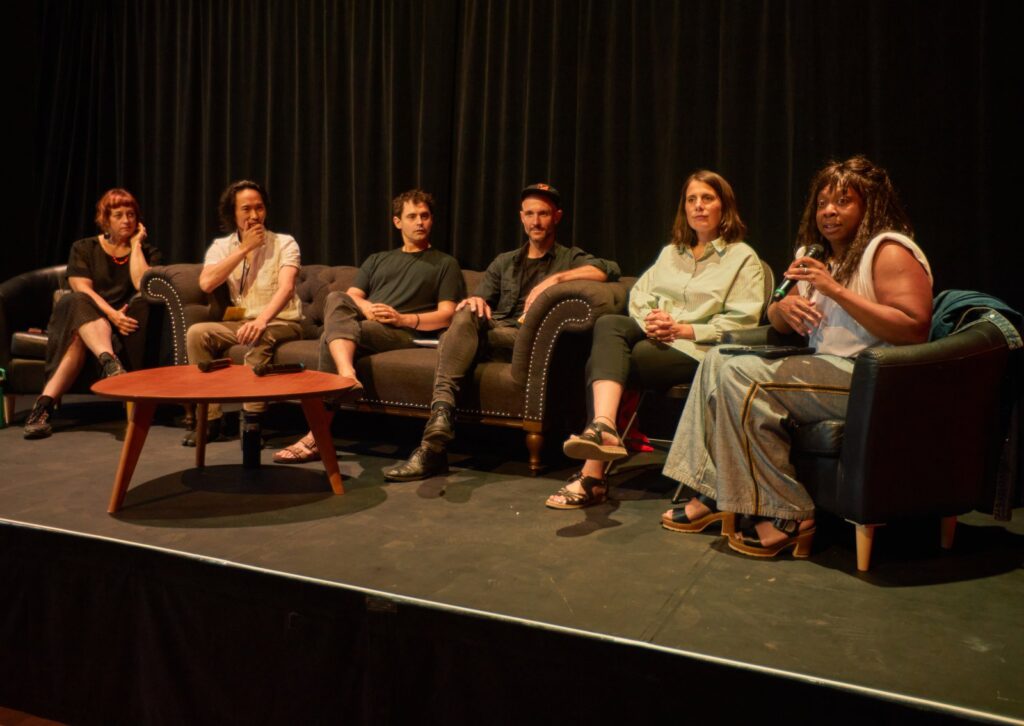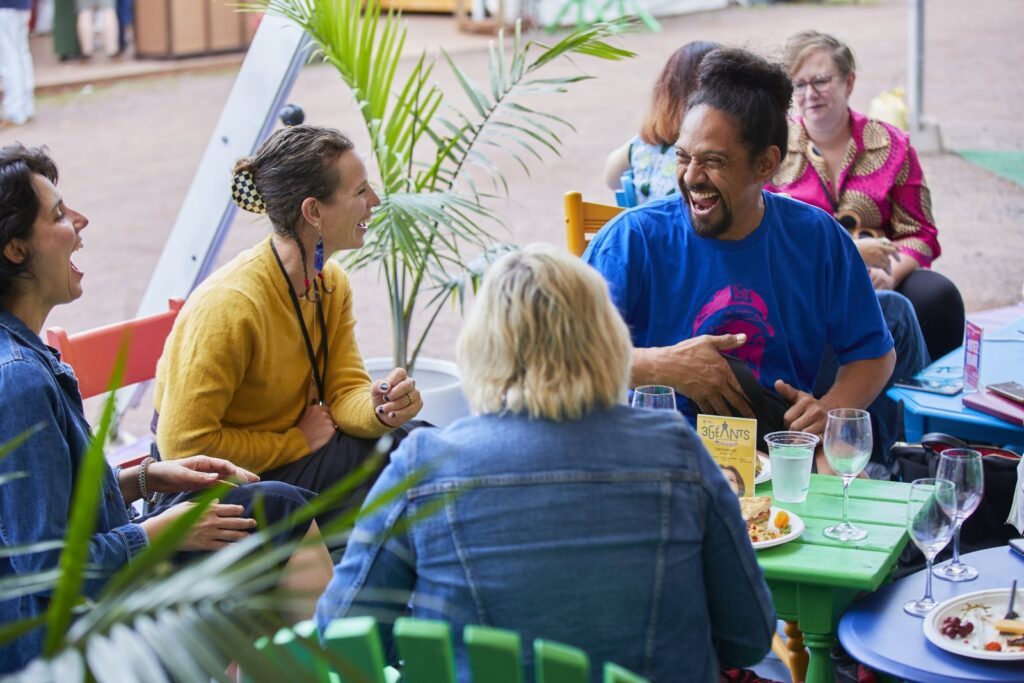Montreal’s Triple Circus Anniversary This Summer Celebrates Ten Years of the MICC

Fifteen years ago, the Montréal Complètement Cirque Festival (established in 2010) realized a collective dream of the Montreal circus community. Key players including TOHU, Cirque Éloize, Les 7 doigts de la main, Cirque du Soleil, the National Circus School, and En Piste combined their vision, expertise, and resources to create North America’s first international festival dedicated to circus arts … and they achieved even more than they envisioned.
As Stéphane Lavoie, General and Programming Director of TOHU, states, they “wanted to introduce the public to this rich, sometimes little-known contemporary art form, which blends astonishing creativity with all art forms and naturally generates diverse encounters, making it an art totally open to the world.”
Since its inception, the festival has evolved into a vital showcasing and networking hub beyond North America – Montréal Complètement Cirque Festival has grown into the international circus community’s and industry’s major annual event and gathering.
At the heart of the festival today is the International Market of Contemporary Circus (aka MICC, acronym based on its French name “le Marché international de cirque contemporain”), an exclusively pro event dedicated to contemporary circus creation, presentation, and touring.
Produced by the TOHU, the MICC offers unparalleled networking opportunities and collaborative events, running concurrently with the festival over four days. This year marks the 10th edition of the MICC, promising workshops, discussion panels, pitch sessions, and dynamic showcases and fostering potential collaborations among participants.
In the forefront of the program is Aaron Marquise, the newly appointed Deputy Director of Circus Arts Programming and Development. Aaron’s diverse background, encompassing roles as a performer, arts educator, and his roles in production, has equipped him with a unique perspective on the industry. His experience also includes founding the Contemporary Circus and Immersive Arts Center (CCIAC) and initiating the International Circus Awards project during the pandemic. Since joining TOHU and the MICC in 2021, Aaron has played a pivotal role in contributing to TOHU’s and the MICC’s mission and thus shaping the future of contemporary circus.
As we look ahead to the 2024 MICC program and special celebrations for its anniversary year, we had the opportunity to sit down with Aaron and learn more about what attendees can expect from this milestone event.
Andrea Honis: Congratulations on your new role! With this being an anniversary year for MICC, it’s an exciting time to come on board.

Aaron Marquise: Firstly, thank you. I’m incredibly honored to have been selected for this role. It truly is a dream come true for me. Not only is it the 10th edition of the MICC, but the festival will also mark its 15th edition, and TOHU will celebrate its 20th anniversary this June, so my inaugural year in this position will be filled with festivities. Quite the auspicious start!
AH: Having attended the MICC since 2015, I’ve noticed its growth in size. The number of attendees seems to grow every year. Could you discuss other changes and developments in the event? How have its mission and vision evolved over the years? And the vision your leadership brings to the table?
AM: Our mission has remained consistent since the inception of the MICC. It has always served as a professional hub for fostering connections and relationships within the performing arts community. Over the years, we’ve witnessed steady growth, with even greater depth in conversations and discussions since my first attendance in 2019. Surprisingly, the pandemic facilitated our progress by transitioning us to the first fully realized online international performing arts market. This enabled us to connect presenters nationwide, whereas previously they may have only engaged with those in their region. I’ve inherited a robust program from my predecessor, but I aim to make two key adjustments to the MICC’s trajectory. Firstly, we need to adapt our online operations and community engagement strategies post-pandemic. Secondly, I intend to encourage earlier arrivals and extended stays during the festival, as the MICC has evolved from being an additional component to a comprehensive operation intertwined with the festival itself.
It is also worth noting that there is a consistent return of attendees to the MICC year after year, which reflects the enduring appeal of what we’ve collectively built, not just during my tenure, but also through the efforts of those who preceded me. Furthermore, it’s thrilling to witness presenters embracing circus in innovative ways, seeking out circus offerings independently and approaching us with exciting proposals. This signifies a significant shift in the landscape of the MICC, heralding an era of dynamic change and boundless possibilities.
AH: The pandemic prompted the introduction of an active year-round membership with regular meetings. Could you elaborate on this aspect of the MICC? Who are the members, who is the membership for, and what does it offer? Additionally, how do you see the membership structure and offerings evolving?
AM: As you’re aware, the MICC aims to gather a global community of professionals committed to the creation, presentation, and touring of contemporary circus worldwide, with a particular focus on North America. Our membership is open to anyone in the circus sector with these objectives, whether they’re presenters, artists, or agents, whether they’re already established professionals or simply curious newcomers. When I first attended the MICC, I had limited knowledge about touring circus; I was an artist eager to learn more, and the MICC provided the perfect platform for that. We truly function as a supportive community, and my philosophy is simple: the door is open to all. I envision the MICC as a space for learning, idea-sharing, and ultimately, expanding audiences’ exposure to a diverse range of circus performances. We employ various methods to accomplish this goal. For presenters, we facilitate online meetings to assist in tour planning, while for other professionals, we strive to offer a comprehensive “toolbox” of resources covering topics such as visas and inclusion riders. Although these resources are accessible online throughout the year, recognizing that many are returning to pre-pandemic routines, we ensure that recordings are available for members unable to attend in real-time, thus maximizing the benefits of membership.
AH: What should participants expect from this anniversary conference? Will there be any differences in structure from previous years? I’d love to hear more about the program—specifically the panels, topics, and themes.
AM: This year’s MICC will follow a similar structure to previous years, with one notable change: Monday night of the Festival programming will be reserved for transitioning between shows, allowing the MICC to showcase Quebec productions prepared for touring. These showcases will range from 20 to 40 minutes, offering a platform to spotlight local circus talent. Additionally, 3 panels will be scheduled throughout the week. Although specific themes are still being finalized, rest assured they will cover exciting and engaging topics.
Something that we will bring back this year is the combined auditions for Quebec circus companies. This event, which we conducted twice before the pandemic, is making a comeback this year. Artists worldwide will have the chance to apply for an audition before all the major circus companies in Quebec, including Cabaret Le Monastère, Cirque du Soleil, Cirque Eloize, Flip Fabrique, Haut Vol, Kalabanté, Les 7 Doigts de la Main, and Machine de Cirque. The auditions are open to all artists, whether or not they’re attending the MICC, and will be conducted in person. It presents a fantastic opportunity to audition for multiple major companies simultaneously. What excites me most is how it represents a moment of unity and collaboration among Quebec’s circus companies. The application for the audition is available via Cirque du Soleil.
AH: For presenting organizations that are still hesitant to include circus arts in their programming, what would you say to persuade them? How can attending the MICC help them gain a comprehensive understanding of the value and appeal of circus arts?
AM: I would pose the question: “Why not?” How can you be certain? Have you attempted it previously? Have you consulted your peers?”When individuals envision circus, they often associate it with elaborate rigging and grand-scale performances. However, they may overlook groundbreaking shows touring with just two artists and no rigging. While technically simple, the artistic impact is profound. To those hesitant about attending the MICC, I would offer a challenge: dare to attend and see if you can’t discover something suitable for your venue, presenting series, or audience engagement.
AH: The pitch sessions are a highlight of the MICC. How many companies are expected this year, and what’s the balance between regional (Quebec, Canada) and international participants?
AM: This year, we reviewed 164 projects from 32 countries with a panel of 12 jury members representing 8 countries. I’m delighted to announce that we’ll be showcasing 42 projects from 23 countries through pitches and showcases. Among these are 9 projects from Québec and 3 projects emerging from the MICC working group known as the Utopians. The Utopians, consisting of 14 presenters from around the globe, collaborate to support new non-commercial circus works by established but under-supported artists. It is going to be a really exciting year for projects presented at the MICC.
AH: Lastly, a personal question, what do you most like about your job?
AM: I’m thrilled to be at the heart of this circus community, serving as a hub for connecting presenters, artists, educators, and everyone involved. It’s amazing to see how circus flows through us, and I cherish the opportunity to be right in the center of it all and a part of TOHU’s history.
Main image: MICC 2023, Photo@Andrew Miller
Editor's Note: At StageLync, an international platform for the performing arts, we celebrate the diversity of our writers' backgrounds. We recognize and support their choice to use either American or British English in their articles, respecting their individual preferences and origins. This policy allows us to embrace a wide range of linguistic expressions, enriching our content and reflecting the global nature of our community.
🎧 Join us on the StageLync Podcast for inspiring stories from the world of performing arts! Tune in to hear from the creative minds who bring magic to life, both onstage and behind the scenes. 🎙️ 👉 Listen now!



